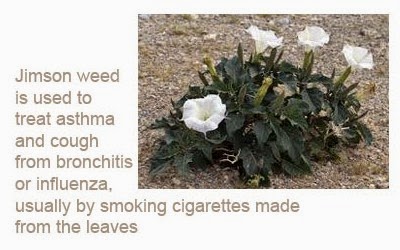Jimson weed is most commonly used as dried leaves, with or without tips of flowering branches. The ripe seeds and flowers without leaves are also used. Seeds are small, long, flat, and dark yellow to brown. Jimson weed's primary action isanticholinergic, caused by 0.1 % to 0.6% atropine, hyoscyamine, and scopolamine. All parts of the plant contain these compounds, but the highest concentration is in the seeds. Anticholinergic levels in other plant parts vary from year to year and from plant to plant. The alkaloids are readily absorbed across GI mucous membranes and across the respiratory tract. Anticholinergic effects usually occur within 60 minutes and may last 24 to 48 hours because of impaired GI motility.
Safety Risk Jimson weed is listed as an unsafe herb by FDA. It isn't recommended for routine therapeutic use.
Jimson weed is used to treat asthma
Reported uses
Jimson weed is used to treat asthma and cough from bronchitis or influenza, usually by smoking cigarettes made from the leaves. It's also used to treat disorders of the autonomic nervous system. Little data exist to support routine therapeutic use of jimson weed.
Illicitly, the seeds have been chewed, the leaves smoked as cigarettes, and a tea brewed and ingested to cause hallucinations and euphoria.
Administration
Dosage and administration aren't well documented.
Hazards
Adverse reactions to jimson weed include headache, confusion, hallucinations, agitation, emotional lability, motor incoordination, restlessness, loss of consciousness, hyperthermia, tachycardia, dilated pupils, blurred vision, photophobia, dry mucous membranes, nausea, vomiting, decreased GI tract motility, dry mouth, urinary retention, tachypnea, dry, flushed skin, and hypertension leading to hypotension.
Additive effects may be seen with anticholinergics such as benzotropine, atropine, scopolamine; with antihistamines such as diphenhydramine; with phenothiazines such as prochlorperazine and promethazine; and with tricyclic antidepressants such as amitriptyline and imipramine. Use of jimson weed with deadly nightshade (belladonna) may cause additive anticholinergic toxicity.
Patients who are pregnant or breast-feeding should avoid use. Those with glaucoma, benign prostatic hyperplasia, urinary retention, tachycardia, or hypersensitivity to jimson weed should also avoid use.
Safety Risk Jimson weed has been associated with seizures, arrhythmias, respiratory depression, and respiratory arrest. Fatal poisonings resulting from respiratory depression and circulatory collapse have been reported from adult doses equal to 10 mg of atropine (15 to 100 g of dried leaves or about 100 [15 to 25 g) of seeds). Fatal doses in children may be much smaller. Fatalities also reported with ingestion of brewed tea.
Clinical considerations
Warn patient that jimson weed isn't recommended for routine therapeutic use.
Don't confuse jimson weed with deadly nightshade (Atropa belladonna), which has similar effects.
Tell patient to report signs and symptoms of anticholinergic toxicity: dilated pupils, impaired vision, dry mouth, heart palpitations, dizziness, confusion, hallucinations, and incoordination.
The antidote for anticholinergic toxicity is physostigmine. To avoid profound cholinergic effects, use it only for severe toxicity, including seizures, severe hypertension, severe hallucinations, life-threatening respiratory depression, or arrhythmias. Avoid using sedatives or phenothiazines to treat toxicity because they may have additive anticholinergic effects.
Advise patient to keep jimson weed away from children and pets.
Tell patient to notify pharmacist of any herbal and dietary supplements that he is taking when obtaining a new prescription.
Advise patient to consult his health care provider before using an herbal preparation because a conventional treatment with proven efficacy may be available.
Research summary
Jimson weed is listed as an unsafe herb by the FDA. It isn't recommended for routine therapeutic use.
Read more on natural herbs [http://www.herbsstore.org/]. Check out for herbal medicines and home remedies.
Article Source: http://EzineArticles.com/?expert=Robin_Brain

No comments:
Post a Comment